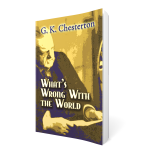Chesterton’s appreciation of the common man predates his college years. His teenage notebooks are full of a reverence for ordinary people, expressed as a corollary to his reverence for the most ordinary of objects and things. Chesterton’s respect for the common man was basically a respect for free will. He said that the actions of a beggar are as momentous as the actions of a prime minister, because the beggar’s actions are no less free and have an eternal significance surpassing all merely temporal enterprises, even those of prime ministers and kings.
This is a view that contradicts the conventional way of looking at things. The decisions and choices of beggars do not seem very momentous to us. We are conditioned to believe that the lives of presidents and dictators, business tycoons and financiers, newscasters and even entertainers, are more important, more influential, more significant than the lives of nameless hobos and panhandlers. Not so Chesterton, in spite of the appearances. As Father Brown expressed it,
I mean that we here are on the wrong side of the tapestry. The things that happen here do not seem to mean anything; they mean something somewhere else.
Chesterton’s admiration for the power of choice in the least of us, made him an extreme democrat in politics, and a life-long Liberal, if a Liberal is someone who champions individual liberty and democratic reform. He called plain folks “the million masks of God” and praised them for their common sense, common decency, and their humble institutions: hearth and home, the family, the church, and the pub. He rejected every sort of elitism, and he most especially denounced the meddlesome elites—the bureaucrats, business tycoons, socialists, politicians, and philanthropists—along with all of their progressive and uplifting ideas for bullying the common man.

